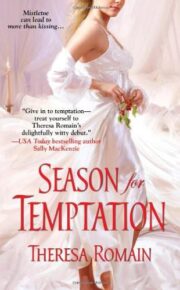Julia, feeling not a bit of pre-wedding nervousness, was unbothered by this statement. “Is it vulgar? Unladylike?” she asked, not bothering to hide her dimples.
The countess looked at her suspiciously. “I suppose it isn’t as bad as all that,” she allowed. She took in the details of the gown, and her expression turned knowing. “I dare say you have your reasons for choosing that one, anyway.”
Indeed she did; Julia felt warm just from the memory. The last time she was in this gown, she and James had first admitted their love for one another. Now, little more than a week later, they would pledge their love forever. It seemed only right.
Besides, it was the most beautiful gown she owned, and a girl did want to look her best for her wedding.
Louisa attended the bride in a gown of the pale primrose shade that suited her rich coloring so well. She had been unfailingly supportive of Julia through what had been one of the strangest and most trying weeks the sisters had ever lived through. When Julia begged her to wear her Helen of Troy costume for the marriage ceremony, though, she put her foot down.
“I won’t do it,” she said, though her eyes were twinkling with amusement. “I’d look ridiculous. Besides, it would be very odd for people to be thinking of Twelfth Night, considering how there’s been a change of bride since then.”
She made this statement without a hint of resentment or constraint, but Julia deemed it best not to press the issue. Mainly because that would then give Louisa cause to demand that Julia wear the terrible fortuneteller costume at her own wedding someday, and she would have to stand up next to her beautiful sister looking like a tomato.
Of all the possible uncomfortable situations at a wedding, that of the former fiancée serving as a bridesmaid to the hastily traded bride — who also happened to be her sister — held great potential to be among the most awkward. Because of the small, close-knit nature of the wedding party, however, everyone carried it off without the least bit of self-consciousness.
Julia granted much of the credit for the success to her sister, who, once she broke her engagement, truly did feel that she had no further hold on James, or he on her. Following the ceremony, Louisa congratulated the bride and groom both with heartfelt embraces. To James, she said simply, “You’ve made the right choice. She truly shall be your better half, as I never could have been.”
James smiled gratefully. “I’ll accept the slander to myself, but not to you.” He cleared his throat, and added in a choked voice, “I’ll be very proud to be a part of your family.”
“Not just that,” Julia chimed in. “She’ll be with us quite a bit of the time, I hope. That is”—she looked questioningly at Louisa—“if you still want to catalogue the library?”
Louisa drew in an eager breath, and looked from Julia to James. “Really? I wouldn’t be in the way?”
James put his arm around Julia and gave her an affectionate squeeze. To Louisa, he nodded his willingness and replied, “If you can keep your sister off the library ladders, you can have every single Gutenberg Bible you find.”
As she had at Lord and Lady Oliver’s wedding so many years before, Lady Irving made a trenchant observation. She had told her brother, long ago, to marry “a snip in her first season,” someone without a family of her own to complicate his life. Amazingly, he remembered this, and he reminded her of it as they all progressed into the dining room for the wedding breakfast.
“Stuff and nonsense,” the countess replied, seating herself next to her brother. “You can’t possibly recall what I told you before your remarriage.”
“I do; I remember it well,” Lord Oliver insisted. “I had just told you I met her at Tattersalls, where she had been looking at the most beautiful dapple gray mare.”
Lady Irving cast her gaze up to heaven, believing this animal-related explanation for his uncannily accurate memory only too well.
“Someone without a family of her own,” she repeated, musing, as she cast her eyes down the long table.
Where the four young Olivers kicked their chair legs, chattered happily, and threw bread across the table at one another.
Butternut the parrot sat on young Tom’s shoulder, stretching his neck and opening his beak for a morsel of food.
Lady Oliver chatted with Gloria, who was letting her younger daughter unpin her hair and create small, messy plaits in it.
Louisa wiped a smut of pudding from Julia’s nose, laughing, as Julia cheerfully motioned to a footman to serve her far more food than any bride ought to have an appetite to eat.
And James sat smiling at his new wife, with such love in his eyes that the countess, who had thought herself immune to this sort of sentimental silliness, actually felt tears well up.
To choose someone without a family. . if he had, none of this would ever have existed.
Lady Irving turned to face her brother again, a repentant expression on her face. She leaned in close to his ear, and spoke to him in a voice pitched for his ears alone.
“Brother, dear, you are only going to hear this from me once in my whole life, so enjoy it.”
She paused, sighed heavily, and said, “I am afraid I have to admit, I was full of rubbish.”


"Season for Temptation" отзывы
Отзывы читателей о книге "Season for Temptation". Читайте комментарии и мнения людей о произведении.
Понравилась книга? Поделитесь впечатлениями - оставьте Ваш отзыв и расскажите о книге "Season for Temptation" друзьям в соцсетях.